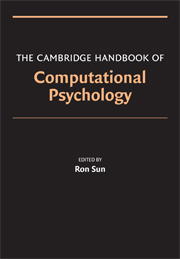Book contents
- The Cambridge Handbook of Computational Psychology
- The Cambridge Handbook of Computational Psychology
- Copyright page
- Contents
- Preface
- List of Contributors
- Part I Introduction
- Part II Cognitive Modeling Paradigms
- Part III Computational Modeling of Various Cognitive Functionalities and Domains
- 7 Computational Models of Episodic Memory
- 8 Computational Models of Semantic Memory
- 9 Models of Categorization
- 10 Micro-Process Models of Decision Making
- 11 Models of Inductive Reasoning
- 12 Mental Logic, Mental Models, and Simulations of Human Deductive Reasoning
- 13 Computational Models of Skill Acquisition
- 14 Computational Models of Implicit Learning
- 15 Computational Models of Attention and Cognitive Control
- 16 Computational Models of Developmental Psychology
- 17 Computational Models of Psycholinguistics
- 18 Computational Models in Personality and Social Psychology
- 19 Cognitive Social Simulation
- 20 Models of Scientific Explanation
- 21 Cognitive Modeling for Cognitive Engineering
- 22 Models of Animal Learning and Their Relations to Human Learning
- 23 Computational Modeling of Visual Information Processing
- 24 Models of Motor Control
- Part IV Concluding Remarks
- Author Index
- Subject Index
14 - Computational Models of Implicit Learning
from Part III - Computational Modeling of Various Cognitive Functionalities and Domains
Published online by Cambridge University Press: 05 June 2012
- The Cambridge Handbook of Computational Psychology
- The Cambridge Handbook of Computational Psychology
- Copyright page
- Contents
- Preface
- List of Contributors
- Part I Introduction
- Part II Cognitive Modeling Paradigms
- Part III Computational Modeling of Various Cognitive Functionalities and Domains
- 7 Computational Models of Episodic Memory
- 8 Computational Models of Semantic Memory
- 9 Models of Categorization
- 10 Micro-Process Models of Decision Making
- 11 Models of Inductive Reasoning
- 12 Mental Logic, Mental Models, and Simulations of Human Deductive Reasoning
- 13 Computational Models of Skill Acquisition
- 14 Computational Models of Implicit Learning
- 15 Computational Models of Attention and Cognitive Control
- 16 Computational Models of Developmental Psychology
- 17 Computational Models of Psycholinguistics
- 18 Computational Models in Personality and Social Psychology
- 19 Cognitive Social Simulation
- 20 Models of Scientific Explanation
- 21 Cognitive Modeling for Cognitive Engineering
- 22 Models of Animal Learning and Their Relations to Human Learning
- 23 Computational Modeling of Visual Information Processing
- 24 Models of Motor Control
- Part IV Concluding Remarks
- Author Index
- Subject Index
Summary
Keywords
- Type
- Chapter
- Information
- The Cambridge Handbook of Computational Psychology , pp. 396 - 421Publisher: Cambridge University PressPrint publication year: 2008
- 32
- Cited by



